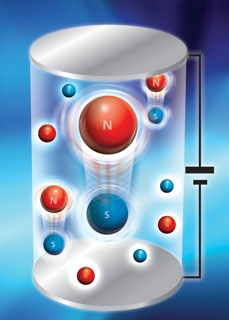| Researchers create capacitor effect for magnetricity |
| (Nanowerk News) Researchers at the London Centre for Nanotechnology (LCN) have created a purely magnetic version of one of the basic effects of electronics - the storage and release of charge in a capacitor. This follows their demonstration last year of the existence of a magnetic equivalent of electricity: so-called "magnetricity". |
| The new research, published in the journal Nature Physics ("Creation and measurement of long-lived magnetic monopole currents in spin ices"), describes how long lived currents of magnetic charges or "monopoles" may be created in spin ice, the special material that hosts magnetricity. The application of a magnetic field to spin ice charges up the material just like the application of an electric field charges up a capacitor. The subsequent release of the magnetic field causes magnetic currents to flow for several minutes, during which time the current can be measured and characterised in detail. |
 |
| Capacitor effect for magnetic monopoles in spin ice. The application of a magnetic potential adds new magnetic monopoles to a crystal of spin ice which then spring apart and store magnetricity. |
| Prof. Steve Bramwell of the LCN collaborated with Dr. Sean Giblin from the ISIS neutron and muon facility, Prof. Ian Terry from Durham University and Prof. Peter Holdsworth from the Ecole Normale Supéieure (ENS) in Lyon, France. They used a sensitive measuring device called a magnetometer to observe and record the magnetic currents in a single spin ice crystal specially prepared by Dr. D. Prabhakaran (Oxford). The researchers then analysed these measurements to prove that the magnetic currents flow in exactly the same way as do electric currents in an electolyte, the material that carries electrical current within a battery. |
| "These measurements establish how magnetricity works at the atomic level" says Prof. Bramwell, " - we now know how fast the magnetic monopoles move and how they combine to create a magnetic current. Technological applications of magnetricity remain a long way off, but to create a capacitor effect is a prerequisite for any kind of future magnetronics - the magnetic version of electronics." |
